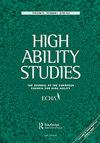High-achieving rural middle-school students’ academic self-efficacy and attributions in relationship to gender
IF 1.8
4区 教育学
Q2 EDUCATION, SPECIAL
引用次数: 6
Abstract
ABSTRACT This research investigates high-achieving, rural middle-school students’ academic attributions and self-efficacy. The study sample (n = 77) included middle-school students attending schools in rural districts in a predominately rural, Midwestern state in the United States (U.S.). There was high participation in the Free and Reduced Lunch (FRL) program in the sample (average of 45.1% among the 8 participating districts). Students attending rural, under-resourced schools in the U.S. are vulnerable with respect to full academic development. We identified academic potential through the administration of a nationally standardized above-level test. Although there were no differences in the study sample’s female and male students’ scores in any of the four subject areas on the above-level test, there were differences for some of the psychosocial variables. A greater percentage of high-achieving males attributed both general school success and math success to ability; a greater percentage of high-achieving female students attributed general school success and math success to effort. Students in rural school districts often lack access to advanced educational opportunities, which may shape their beliefs about academic potential and self-efficacy and impact decisions regarding advanced coursework. Implications for school practitioners to foster the immediate and long-term talent development of high-achieving rural students are discussed.农村高中学生学业自我效能感与性别归因的关系
摘要本研究旨在探讨农村高成就中学生学业归因与自我效能感的关系。研究样本(n = 77)包括在美国中西部一个以农村为主的州的农村地区上学的中学生。样本中免费和减少午餐(FRL)计划的参与率很高(8个参与地区的平均参与率为45.1%)。在美国,在资源不足的农村学校上学的学生在全面的学术发展方面是脆弱的。我们通过实施国家标准化的水平以上考试来确定学生的学术潜力。尽管研究样本中的男女学生在上述四个学科领域的得分都没有差异,但在一些社会心理变量上却存在差异。成绩优异的男性将学业成绩和数学成绩都归功于能力的比例更高;在成绩优异的女学生中,更多的人将学业成绩和数学成绩归功于努力。农村学区的学生往往缺乏接受高等教育的机会,这可能会影响他们对学术潜力和自我效能的看法,并影响他们对高等课程的决定。讨论了学校实践者促进农村优秀学生的近期和长期人才发展的意义。
本文章由计算机程序翻译,如有差异,请以英文原文为准。
求助全文
约1分钟内获得全文
求助全文
来源期刊

High Ability Studies
Multiple-
CiteScore
4.80
自引率
11.10%
发文量
7
期刊介绍:
High Ability Studies provides a forum for scholars in a variety of disciplines associated with the development of human abilities to their highest level. It is a medium for the promotion of high ability, whether through the communication of scientific research, theory, or the exchange of practical experience and ideas. The contents of this journal are unique in reflecting concerns and recent developments in this area from childhood and across the whole life span in a variety of contexts. Far from being restricted to the traditional focus on high-level cognitive development, it also presents investigations into all other areas of human endeavour, including sport, technology, the arts, business, management and social relations.
 求助内容:
求助内容: 应助结果提醒方式:
应助结果提醒方式:


